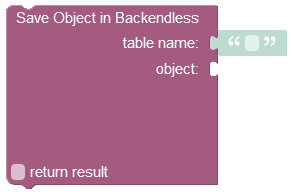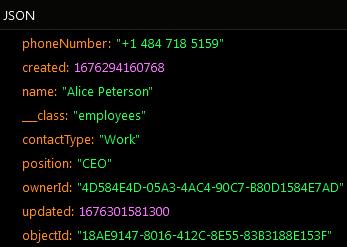Updating Single Object¶
Blocking Method¶
Dictionary<string, object> result;
result = Backendless.Data.Of( "TABLE-NAME" ).Save( Dictionary<string, object> );
public E Backendless.Data.Of<E>().Save( E entity );
Non-Blocking API¶
void Backendless.Data.Of( "TABLE-NAME" ).Save( Dictionary<string, object> entity,
AsyncCallback<Dictionary<string, object>> responder )
public void Backendless.Data.Of<E>().Save( E entity, AsyncCallback<E> responder )
where:
| Argument | Description |
|---|---|
TABLE-NAME |
Name of the table where the object represented by System.Collections.Generic.Dictionary will be updated. |
E |
A .NET class of the data object to update. |
entity |
.NET object to update, must be of type E or System.Collections.Generic.Dictionary (depending on the method used). |
responder |
a responder object which will receive a callback when the method successfully updates the object or if an error occurs. Applies to the non-blocking method only. |
Return Value¶
The blocking method returns the updated object. The non-blocking call receives the return value through a callback executed on the AsyncCallback object.
Example¶
Blocking API¶
``` csharp
static void UpdateContact()
{
// create new contact object first. Then we will update it.
Dictionary<string, object> contact = new Dictionary<string, object>();
contact.Add( "Name", "Jack Daniels" );
contact.Add( "Age", 147 );
contact.Add( "Phone", "777-777-777" );
contact.Add( "Title", "Favorites" );
Dictionary<string, object> savedContact = Backendless.Persistence.Of( "Contact" ).Save( contact );
// now update the saved object
savedContact[ "Title" ] = "Most favorite";
Backendless.Persistence.Of( "Contact" ).Save( savedContact );
}
```
Non-blocking API¶
``` csharp
static void UpdateContactAsync()
{
// create new contact object first. Then we will update it.
Dictionary<string, object> contact = new Dictionary<string, object>();
contact.Add( "Name", "Jack Daniels" );
contact.Add( "Age", 147 );
contact.Add( "Phone", "777-777-777" );
contact.Add( "Title", "Favorites" );
AsyncCallback<Dictionary<string, object>> updateObjectCallback;
updateObjectCallback = new AsyncCallback<Dictionary<string, object>>(
savedContact =>
{
System.Console.WriteLine( "object has been updated" );
},
error =>
{
}
);
AsyncCallback<Dictionary<string, object>> saveObjectCallback;
saveObjectCallback = new AsyncCallback<Dictionary<string, object>>(
savedContact =>
{
System.Console.WriteLine( "object has been created, now make an API call to update it" );
// now update the saved object
savedContact[ "Title" ] = "Most favorite";
Backendless.Persistence.Of( "Contact" ).Save( savedContact, updateObjectCallback );
},
error =>
{
}
);
Backendless.Persistence.Of( "Contact" ).Save( contact, saveObjectCallback );
}
```
Consider the following class:
public class Contact
{
//use the Weborb.Service namespace to import the annotation
[SetClientClassMemberName( "objectId" )]
public String ObjectId { get;set; }
public String Name { get; set; }
public int Age { get; set; }
public String Phone { get; set; }
public String Title { get; set; }
}
Blocking API¶
``` csharp
static void UpdateContactUsingClass()
{
// create new contact object first. Then we will update it.
Contact contact = new Contact();
contact.Name = "Jack Daniels";
contact.Age = 147;
contact.Phone = "777-777-777";
contact.Title = "Favorites";
Contact savedContact = Backendless.Persistence.Of<Contact>().Save( contact );
// now update the saved object
savedContact.Title = "Most favorite";
Backendless.Persistence.Of<Contact>().Save( savedContact );
}
```
Non-blocking API¶
``` csharp
static void UpdateContactAsyncUsingClass()
{
// create new contact object first. Then we will update it.
Contact contact = new Contact();
contact.Name = "Jack Daniels";
contact.Age = 147;
contact.Phone = "777-777-777";
contact.Title = "Favorites";
AsyncCallback<Contact> updateObjectCallback = new AsyncCallback<Contact>(
savedContact =>
{
System.Console.WriteLine( "object has been updated" );
},
error =>
{
}
);
AsyncCallback<Contact> saveObjectCallback = new AsyncCallback<Contact>(
savedContact =>
{
System.Console.WriteLine( "object has been created, now make an API call to update it" );
// now update the saved object
savedContact.Title = "Most favorite";
Backendless.Persistence.Of<Contact>().Save( savedContact, updateObjectCallback );
},
error =>
{
}
);
Backendless.Persistence.Of<Contact>().Save( contact, saveObjectCallback );
}
```
Codeless Reference¶

where:
| Argument | Description |
|---|---|
table name |
Name of the data table where a record must be updated. |
object |
An object with properties that match the names of the table columns, these properties must contain new values for update operation. The objectId property and the corresponding value must be also included in the object. |
return result |
Optional parameter. When this box is checked, the operation returns the updated object. |
Returns the updated object.
Consider the following record stored in the employees data table:
The example below uses the objectId: "18AE9147-8016-412C-8E55-83B3188E153F" to find the record in the data table and update the value in the contactType column from "Personal" to "Work". To update more values in one query, specify the required number properties/column in the object and the new values.

The result of this operation will look as shown below after the Codeless logic runs:

Moreover, the operation described above has returned the updated object:
